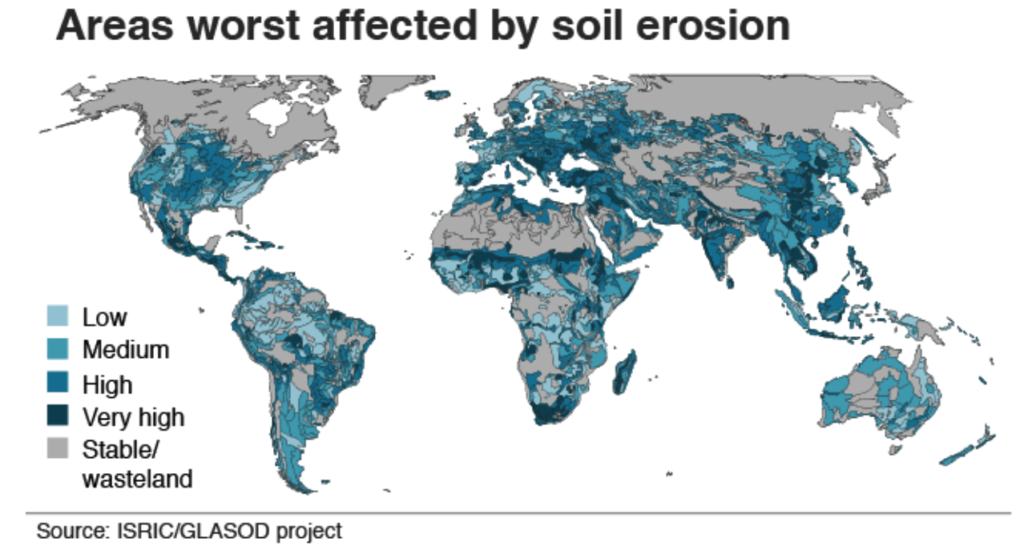It’s been reported that climate change can’t be halted if we continue to degrade soil. According to recent research, there is three times more carbon in soil than in the atmosphere. Poor farming and deforestation are thought to be some reasons behind these high levels of carbon in soil. Soil with high levels of carbon impacts climate change as it compromises the growth of plants, which take carbon from the atmosphere and release soil carbon that was previously stored by worms taking leaf matter underground.
This warning comes from the IPBES – the Intergovernmental Science-Policy Platform on Biodiversity and Ecosystem Services.

Prof Jane Rickson from Cranfield University, mentioned: “The thin layer of soil covering the Earth’s surface represents the difference between survival and extinction for most terrestrial life.
Soil forms at the rate of 1cm every 300 years! 75 billion tonnes of soil is lost each year due to degradation each year. Although most of the soil degradation is taking place in areas such as South America and China, the UK is not exempt. In the South West, some maize fields suffer soil loss due to extensive rainfall, after the maize left soil exposed. In recent years, we have seen an increase in dramatic rainfall and floods, which are a symptom of climate change. Intensive crop farming has also caused a loss of over 12 inches of soil in some locations in the UK. Bearing in mind soil forms at 1cm every 300 years, 12 inches would take some 9,000+ years to recover.
We need to focus on letting forests grow back, which is know as “rewilding”.
What is Rewilding?
Rewilding is people and natural processes, working together at scale for the long term. According to www.rewildingbritain.org.uk there are four key principles that guide their approach to this:
- Rewilding embraces the role of people – and their cultural and economic connections to the land – working within a wider, healthy ecosystem.
- Rewilding seeks to reinstate natural processes – for example, the free movement of rivers, natural grazing, habitat succession and predation. It is not geared to reach any human-defined optimal point or end state. It goes where nature takes it.
- Rewilding requires working at sufficient scale to allow nature to be the driver for change, reinstate natural processes and create ecologically coherent units.
- Rewilding is an opportunity to leave a positive legacy for future generations. The continued, long-term benefits of rewilding areas should be secured.
It is believed that rewilding provides for the future and can start reversing the centuries of ecological damage, while helping support struggling rural communities.
Losing Ancient Woodland:
We have spoken at length in the past about rebuilding woodlands to help fight climate change.
The 40 years after the Second World War, we lost more ancient woodland than we had in the last 400 years. This startling fact is proof of how much damage we are doing to our environment. Damage is having a profound impact on climate change. This loss of woodland is contributing to soil loss and, sadly, assisting climate change. Reversing such, as much as possible, will be a great move for the environment, and for fighting climate change.
Why Burning Wood is Sustainable:
Burning wood on a high-efficiency stove can produce less CO2 than if the wood was left to rot on the forest floor. So not only is burning wood sustainable, it’s is actively helping fight climate change. Despite lots of mis-information around currently about stoves, it’s important to realise the truth, and how they can play a key role in fighting climate change.
Grow One Tonne of Firewood Every Five Years!
Don’t live close to a forest but want to produce your own firewood? You don’t need acres of land. As little as 10 x 15m space (half the size of an allotment) would provide around one tonne of firewood every five years. This means a very healthy supply of firewood each year, around 200kg, which is more than enough for most households over the winter months. This is sustainable, environmentally friendly and a free way to keep warm!








